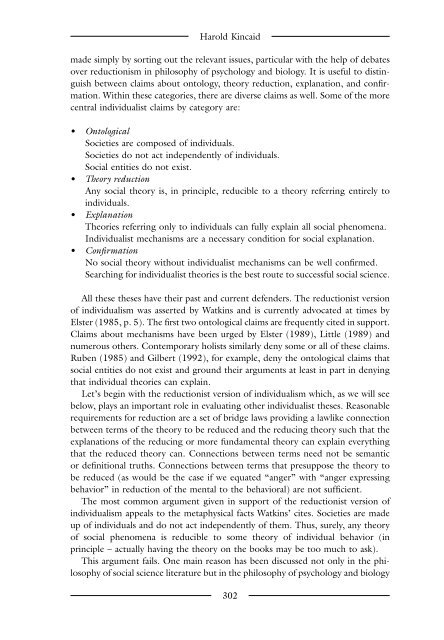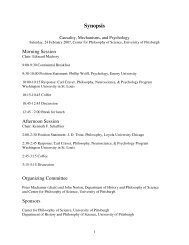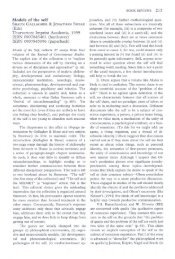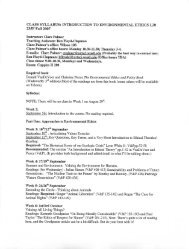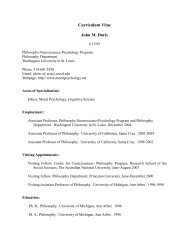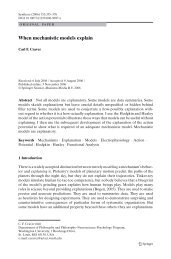The Blackwell Guide to the Philosophy of Science - The Department ...
The Blackwell Guide to the Philosophy of Science - The Department ...
The Blackwell Guide to the Philosophy of Science - The Department ...
Create successful ePaper yourself
Turn your PDF publications into a flip-book with our unique Google optimized e-Paper software.
Harold Kincaid<br />
made simply by sorting out <strong>the</strong> relevant issues, particular with <strong>the</strong> help <strong>of</strong> debates<br />
over reductionism in philosophy <strong>of</strong> psychology and biology. It is useful <strong>to</strong> distinguish<br />
between claims about on<strong>to</strong>logy, <strong>the</strong>ory reduction, explanation, and confirmation.<br />
Within <strong>the</strong>se categories, <strong>the</strong>re are diverse claims as well. Some <strong>of</strong> <strong>the</strong> more<br />
central individualist claims by category are:<br />
• On<strong>to</strong>logical<br />
Societies are composed <strong>of</strong> individuals.<br />
Societies do not act independently <strong>of</strong> individuals.<br />
Social entities do not exist.<br />
• <strong>The</strong>ory reduction<br />
Any social <strong>the</strong>ory is, in principle, reducible <strong>to</strong> a <strong>the</strong>ory referring entirely <strong>to</strong><br />
individuals.<br />
• Explanation<br />
<strong>The</strong>ories referring only <strong>to</strong> individuals can fully explain all social phenomena.<br />
Individualist mechanisms are a necessary condition for social explanation.<br />
• Confirmation<br />
No social <strong>the</strong>ory without individualist mechanisms can be well confirmed.<br />
Searching for individualist <strong>the</strong>ories is <strong>the</strong> best route <strong>to</strong> successful social science.<br />
All <strong>the</strong>se <strong>the</strong>ses have <strong>the</strong>ir past and current defenders. <strong>The</strong> reductionist version<br />
<strong>of</strong> individualism was asserted by Watkins and is currently advocated at times by<br />
Elster (1985, p. 5). <strong>The</strong> first two on<strong>to</strong>logical claims are frequently cited in support.<br />
Claims about mechanisms have been urged by Elster (1989), Little (1989) and<br />
numerous o<strong>the</strong>rs. Contemporary holists similarly deny some or all <strong>of</strong> <strong>the</strong>se claims.<br />
Ruben (1985) and Gilbert (1992), for example, deny <strong>the</strong> on<strong>to</strong>logical claims that<br />
social entities do not exist and ground <strong>the</strong>ir arguments at least in part in denying<br />
that individual <strong>the</strong>ories can explain.<br />
Let’s begin with <strong>the</strong> reductionist version <strong>of</strong> individualism which, as we will see<br />
below, plays an important role in evaluating o<strong>the</strong>r individualist <strong>the</strong>ses. Reasonable<br />
requirements for reduction are a set <strong>of</strong> bridge laws providing a lawlike connection<br />
between terms <strong>of</strong> <strong>the</strong> <strong>the</strong>ory <strong>to</strong> be reduced and <strong>the</strong> reducing <strong>the</strong>ory such that <strong>the</strong><br />
explanations <strong>of</strong> <strong>the</strong> reducing or more fundamental <strong>the</strong>ory can explain everything<br />
that <strong>the</strong> reduced <strong>the</strong>ory can. Connections between terms need not be semantic<br />
or definitional truths. Connections between terms that presuppose <strong>the</strong> <strong>the</strong>ory <strong>to</strong><br />
be reduced (as would be <strong>the</strong> case if we equated “anger” with “anger expressing<br />
behavior” in reduction <strong>of</strong> <strong>the</strong> mental <strong>to</strong> <strong>the</strong> behavioral) are not sufficient.<br />
<strong>The</strong> most common argument given in support <strong>of</strong> <strong>the</strong> reductionist version <strong>of</strong><br />
individualism appeals <strong>to</strong> <strong>the</strong> metaphysical facts Watkins’ cites. Societies are made<br />
up <strong>of</strong> individuals and do not act independently <strong>of</strong> <strong>the</strong>m. Thus, surely, any <strong>the</strong>ory<br />
<strong>of</strong> social phenomena is reducible <strong>to</strong> some <strong>the</strong>ory <strong>of</strong> individual behavior (in<br />
principle – actually having <strong>the</strong> <strong>the</strong>ory on <strong>the</strong> books may be <strong>to</strong>o much <strong>to</strong> ask).<br />
This argument fails. One main reason has been discussed not only in <strong>the</strong> philosophy<br />
<strong>of</strong> social science literature but in <strong>the</strong> philosophy <strong>of</strong> psychology and biology<br />
302


